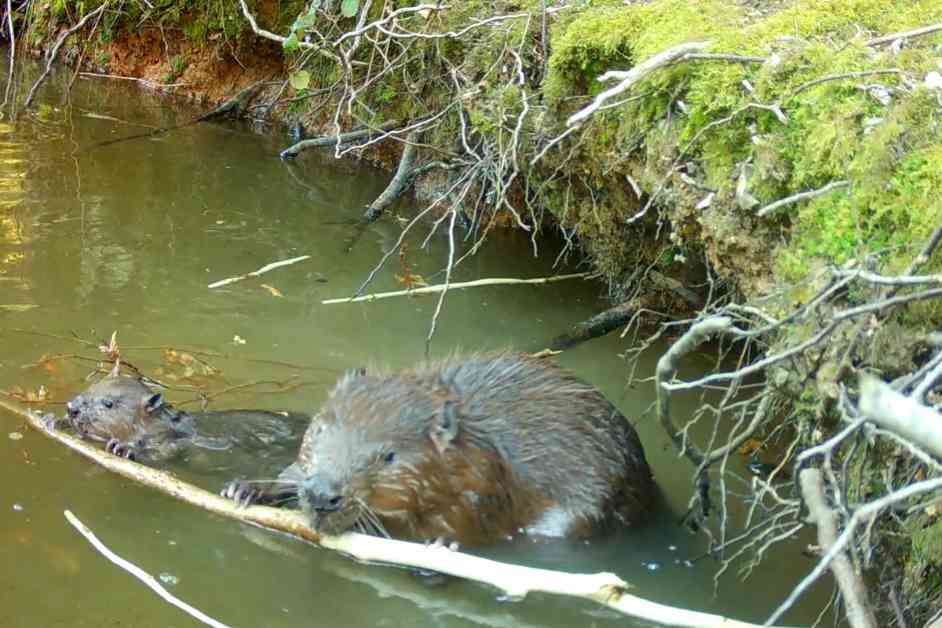Beavers have made a remarkable return to Hampshire after a 400-year absence, marking a significant milestone in the conservation efforts of these iconic creatures. The birth of two baby beavers, also known as kits, at the Ewhurst Park estate near Basingstoke has captured the attention of wildlife enthusiasts and conservationists alike. This historic event not only signifies the successful reestablishment of beavers in the region but also highlights the important role these semi-aquatic mammals play in restoring ecosystems and promoting biodiversity.
A Historic Reintroduction
The birth of the two kits in early July was a momentous occasion for the team at Ewhurst Park, who have been working tirelessly to reintroduce beavers to Hampshire after centuries of absence. The parents of the kits, Chompy and Hazel, were released into the enclosure in January 2023, marking the first time beavers had been seen in Hampshire since the 1600s. The successful breeding of these beavers is a testament to the dedication and commitment of the conservationists at Ewhurst Park, who have created a suitable habitat for these creatures to thrive.
Fiona Kenny, the head of ecology management at Ewhurst Park, described the joy of witnessing the newborn kits for the first time. “I was showing a group around the beaver enclosure when I heard a distinctive sploshing sound,” she recalled. “All of a sudden, we were amazed to see a baby beaver splashing about in the water. It was an incredible moment that will be etched in my memory forever.”
The Role of Beavers in Ecosystem Restoration
Beavers are often referred to as “ecosystem engineers” due to their remarkable ability to transform landscapes through dam-building and tree-felling activities. These modifications not only create vital habitat for a diverse range of species but also help to mitigate flooding risks and improve water quality. By reintroducing beavers to the wild, conservationists hope to harness their natural behaviors to restore degraded ecosystems and promote biodiversity.
Roisin Campbell-Palmer, the head of restoration at Beaver Trust, emphasized the importance of beavers in addressing the climate and nature crises. “Each new generation of kits is wonderful to see and a sign that the pair are settling well,” she stated. The presence of beavers in Hampshire represents a significant step towards a more sustainable and resilient environment, where wildlife can thrive and ecosystems can flourish.
Conservation Efforts and Future Prospects
The successful breeding of Chompy and Hazel at Ewhurst Park is a promising sign for the future of beavers in Hampshire. As part of wider rewilding efforts on the estate, the arrival of the kits signifies a positive shift towards restoring the natural balance of the landscape and promoting coexistence between humans and wildlife. Mandy Lieu, the owner of Ewhurst Park, expressed her excitement about the beavers’ impact on the estate. “The beavers’ modifications to the landscape through damming and tree felling have been extraordinary,” she remarked. “We have already recorded many important species in the enclosure, including very rare barbastelle bats.”
The Ewhurst Park project is just one example of the growing interest in reintroducing beavers to their native habitats across England. By collating data on Chompy and Hazel’s offspring in a “beaver studbook,” conservationists hope to monitor the species’ progress and contribute valuable insights to ongoing conservation efforts. With the support of organizations like Beaver Trust and Natural England, the future of beavers in Hampshire looks promising, with the potential for further reintroductions and breeding success in the years to come.
In conclusion, the rare birth of beavers in Hampshire after a 400-year absence represents a significant milestone in the conservation of these iconic mammals. The successful reintroduction of Chompy and Hazel at Ewhurst Park highlights the importance of restoring ecosystems and promoting biodiversity through the presence of beavers in the wild. As we celebrate this historic event, let us remember the crucial role that beavers play in shaping our natural world and safeguarding the future of our planet.












